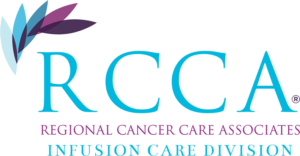Amyotrophic Lateral Sclerosis (ALS) Care in NJ, CT, MD, and the Washington, DC Area
Amyotrophic Lateral Sclerosis ALS
Amyotrophic lateral sclerosis (ALS) — also referred to as Lou Gehrig’s disease — is a nervous system disorder that develops over time. While ALS cannot be cured, several treatment options, including infusion therapy, are available to slow progression of the disease and manage its symptoms. At Regional Cancer Care Associates, our highly experienced team of physicians and nurses use infusion therapy and other advanced treatments to provide patients in New Jersey, Connecticut, Maryland, and the Washington, D.C., area with outstanding, compassionate care for cancer, blood disorders, and conditions such as ALS.
What Is ALS?
The nervous system consists in part of motor neurons that run from the brain to the spinal cord, where they then spread to muscles throughout the body. These neurons facilitate muscle control and voluntary movement. In people with ALS, motor neurons gradually deteriorate and then die. Without these neurons, the brain cannot start or manage muscle activity. Over time, people with ALS may also lose their ability to talk, eat, and even to breathe on their own.
Symptoms of ALS
Most people with ALS have weakened or paralyzed muscles that degenerate over time, but other symptoms also may occur, and differ depending on the specific neurons affected. In many patients, ALS begins in the hands, feet, or limbs and spreads to other body parts. Symptoms also may first appear in the muscles directing speech and swallowing. As a result, a person with ALS may display one or more of the following signs:
- Frequently falling or tripping
- Trouble walking (due to leg, ankle, and feet fatigue)
- Difficulty grasping items or frequently dropping them (due to hand weakness)
- Cramping or twitching in the tongue, arms, or shoulders
- Slurred speech
- Swallowing issues
- Breathing problems (which may necessitate permanent ventilation support)
- Cognitive and behavioral differences
- Uncontrollable laughing or crying
ALS impacts only motor neurons, meaning it will not change other bodily functions. Specifically, it does not affect the five senses (sight, hearing, smell, taste, and touch), eye muscles, or the bladder.
ALS Risk Factors
Cases of inherited ALS make up only 5% to 10% of all people with the disease. For the remaining individuals with ALS, the cause is not clear. However, research into the condition reveals that some factors increase a person’s risk of getting the disease, including:
- Age: As people age, their risk of contracting ALS increases. The ailment most often affects people between 40 years of age and their mid-60s.
- Sex: Men tend to experience ALS more than women, at least until age 65. After that point, the discrepancy between the sexes d
- Exposure to environmental toxins: Some studies suggest that workplace contaminants might be related to development of ALS cases. However, these studies have not found concrete or consistent evidence that exposure to any particular substance leads to the disease.
- Smoking: Unlike environmental toxins, more evidence points toward smoking as a risk factor for ALS, especially in postmenopausal women.
- Military background: Some research has found that people who served in the military are more likely to get ALS, although it is unclear what factors related to military service might increase this risk.
While, as noted, inherited cases account for only a small number of patients with ALS, children of people with familial ALS have a 50% chance of developing the disorder.
Diagnosing ALS
Because ALS can mimic other neurological diseases, it can be challenging to diagnose the condition. Therefore, doctors often conduct several tests to rule out other conditions before diagnosing the patient with ALS. These tests include:
- Nerve conduction velocity (NCV) studies
- Electromyography (EMG)
- Magnetic resonance imaging (MRI) and X-rays
- Myelogram of the cervical spine
- Lumbar puncture (spinal tap)
- Muscle or nerve biopsy
- Blood and urine tests
Infusion Therapy Treatment for ALS
ALS is incurable, but treatment is available to impede the disease’s progression, reduce the risk of complications, and enhance the patient’s overall quality of life. Treatment for ALS may include medications, therapies (i.e., physical, occupational, speech), and nutritional guidance.
Regional Cancer Care Associates provides infusions that a patient’s neurologist has prescribed as treatment for ALS. With infusion therapy, patients receive medication intravenously. At each RCCA treatment center, a warm and welcoming atmosphere gives patients maximum comfort when receiving infusion therapy.
Our medical team has extensive experience with infusion therapy, providing infusions tens of thousands of times every year for multiple medical issues, including cancer, autoimmune diseases, neurological conditions, and other chronic conditions. They take their time with each patient, educating the person on how the treatment works and advising them of potential side effects.
Seek Infusion Therapy at Regional Cancer Care Associates
Contact Regional Cancer Care Associates today to learn more about infusion therapy for patients with ALS, or visit one of RCCA’s community-based care locations in New Jersey, Connecticut, Maryland, and the Washington, D.C., area.
CONVENIENT LOCATIONS IN New Jersey, Connecticut, Massachusetts, Maryland, and the Washington, DC area
Get the treatment you need, close to home. Regional Cancer Care Associates has more than 20 locations throughout CT, MA, MD, and NJ. For more information, or to schedule an appointment, call 844-346-7222.
